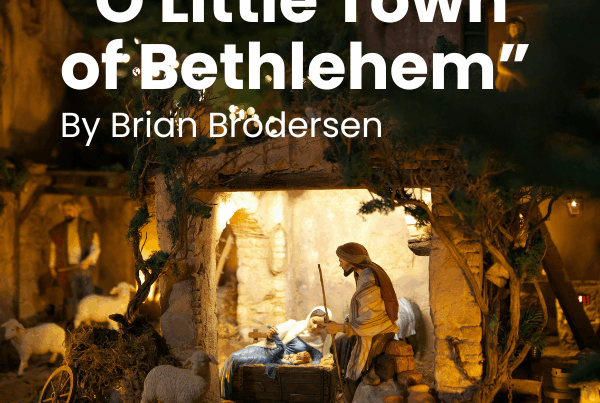
Part 2 of 3
* This article is adapted from a series of papers written for Western Seminary.
Continuing this three-part celebration of Advent, this article centers around the coming of the Son of God in the flesh—the redemptive plan of God the Father accomplished through the working of the Holy Spirit. Specifically, my intention is to focus on the involvement of the Son, the second Person of the Trinity. As a result, we will better understand the means of our justification as well as the pattern we can follow toward sanctification and formation.
The Incarnation
While debated by some—(The ancient Arians asserted that Jesus wasn’t equal with the Father, and the modern Jehovah’s Witnesses and Muslims make similar claims)—the doctrine of the Trinity, at its core, asserts that Jesus is as much divine as is the Father, with both sharing the sovereign will, power, and authority that belong to God alone. As a result, the doctrine of the Trinity asserts that the one who came forth from Mary in human flesh was, in the language of the Nicene Creed, “very God,” not some lesser divine being, or a would-be God-in-the-making. Unless Jesus is one with the Father, He can’t really be Emmanuel and the doctrine of the Trinity provides the core root that supports and sustains the season we celebrate as Advent. As Douglas Wilson explains it in God Rest Ye Merry: Why Christmas is the Foundation for Everything,
Christ came to “ransom captive Israel” and to “disperse the gloomy clouds of night.” In our insolence, we were “doomed by law to endless woe” and were necessarily and justly consigned to “the dreadful gulf below.” But this darkness we had created was invaded by the heavenly host, “Rank on rank the host of heaven spreads its vanguard on the way,” and the night above the shepherds lit up as though a lightening bolt had refused to go out, had refused to stop shining. The road was weary, but now we may urge others to “rest beside the weary road, and hear the angels sing.” We needed this salvation just as He gave it. “O Savior, King of glory, who doest our weakness know.” The God who knows our frame timed it perfectly.[1]
Immanuel, God with Us
While the incarnation is an event that encompasses the entirety of the Trinitarian community, it is most profoundly an event that concerns the second Person of the Trinity: God the Son. The Father and the Spirit are active in the sending of the Son, but the Son alone is changed, humbled or “incarnated.” The English word incarnation comes from the Latin caro: “flesh,” so the Christmas event is the “en-flesh-ment” of God. This is the teaching of the New Testament at several key points. For example, Matthew 1:23 states, “Behold, the virgin shall conceive and bear a son, and they shall call his name Immanuel (which means, God with us)” (ESV). Here we see the redemptive plan, which was prophesied in the days of the prophets, has come to pass. The virgin is bringing forth a male child, and this child shall be called God with us!
There are many stories of unlikely and miraculous births throughout the lives of the patriarchs and Old Testament saints, but each of those surprising and miraculous pregnancies resulted in an ordinary child being born. This was often a child who ended a lifetime of barrenness for the mother, and who would often go on to be a notable character in the following chapters—but an ordinary, human child nevertheless, with strengths and weaknesses, flaws and virtues, just like every other boy or girl on the playground. But there is something different and notable about THIS miraculous birth. This child shall be called Immanuel, which means God with us. The introduction of Jesus in the opening chapter of the New Testament makes it clear that He is God, enfleshed. John 1:14 states, “And the Word became flesh and dwelt among us, and we have seen his glory, glory as of the only Son from the Father, full of grace and truth.”
The Word, Logos
The beginning of John’s gospel reaches back to the beginning and speaks of the Word (Logos), who is with God, and yet is God Himself as well. Jack Kilcrease writes, “John begins his Gospel by stating that Jesus is God’s eternal Word, who created the universe (John 1:1–2). The Word is the self-expression of God, His active force in the world.”[2] In the beginning He spoke and the world existed. As Psalm 33:6 reveals, “By the word of the Lord the heavens were made, and by the breath of his mouth all their host.” And Psalm 107:20 reveals, “He sent out His word and healed them, and delivered them from their destruction.”
For us today, words are an essential part of our communication. (Not all communication is verbal, but a lot of it is!) Autism parents often use the phrase “use your words” in an attempt to help silent neuroatypical children express to the outside world what is going on in their secret interior mind. Likewise, God’s Words are expressions to others revealing what His interior life is like. In time, the Word became incarnate and dwelt among humanity allowing them to behold the glory of God. My seminary professor Gerry Breshears explains it like this: “The Logos is one of the strongest arguments for the deity of Jesus as the personal, eternally existing creator of the universe, distinct from yet equal with God the Father, who became incarnate (or came in the flesh) to demonstrate His glory in grace and truth to reveal life and light to men.” [3]
Fully God, Fully Man
For the second Person of the Trinity, the events of Christmas were deeply experiential, with real and profound implications on His life, from that point onward. He left the comforts and adoration of heaven to become a human with all the accompanying frailties and limitations. He was born into a country, culture, and people. He was born into a family and subculture, thus destined to wear the same clothes that everyone else wore and participate in the same traditions. He ate and slept. In short, He became one of us. Not God masquerading as a person, but Jesus dwelling bodily. As Breshears puts it, “Therefore, by incarnation we mean that the eternal second person of the Trinity entered into history as the Man Jesus Christ.”[4]
How could God become a man? The Heidelberg Catechism summarises the incarnation in these words: “The eternal Son of God, who is and remains true and eternal God, took upon himself true human nature from the flesh and blood of the virgin Mary, through the working of the Holy Spirit” which is based on the truths of the Chalcedonian Creed. The Chalcedonian Creed states that Jesus Christ is “truly God and truly man, of a rational soul and body; coessential with the Father according to the Godhead, and consubstantial with us according to the manhood; in all things like unto us, without sin.” In sum, the creed declares that Jesus Christ in one person with two natures (human and divine) who is both fully God and fully man.
The change implicit in the incarnation (as mentioned above) was not a change of subtraction, but of addition. Augustine puts it succinctly when he writes that the second Person of the Trinity “was made what He was not, without losing what He was. The man therefore was added to the God, that He might be man who was God, but not that He should now henceforth be man and not be God.”[5] How should this effect us today? Chiefly and foremostly, the coming of Jesus is to deliver sinners from judgement and to establish His kingdom on earth. The hymn “Come, Thou Long Expected Jesus” poetically summarizes it in this way:
Born Thy people to deliver,
born a child and yet a King,
born to reign in us forever,
now Thy gracious kingdom bring.
Unparalleled Humility, Then and Now
In addition to the rescuing of sinners and the establishment of His kingdom, His birth, way of life, and even the manner of His death are exemplary for Christians. Jesus exemplified unparalleled humility in lowering and emptying Himself of the comforts, power and glory of the independent exercise of His divine attributes in exchange for a life of humility. Philippians 2:5-11 describes the cascading levels of lowering and humility that Christ underwent in order to accomplish His mission: coming as a human, and not only that, but as a serving human. Then He comes to die, and not only that, but even death on the cross! Paul uses this example to call Philippian Christians to a humble lifestyle and to develop habits of preferring others above self. As Breshears states, “In his incarnation, the Creator entered into his creation to reveal God to us, identify with us, and live and die for us as our humble servant.”[6] The humble incarnation of God the Son has provided the means by which we are justified and sets a pattern for our sanctification and formation as well. In humility we were saved, and in humility we should follow in His footsteps.
___________________________________________________________________________________________________







